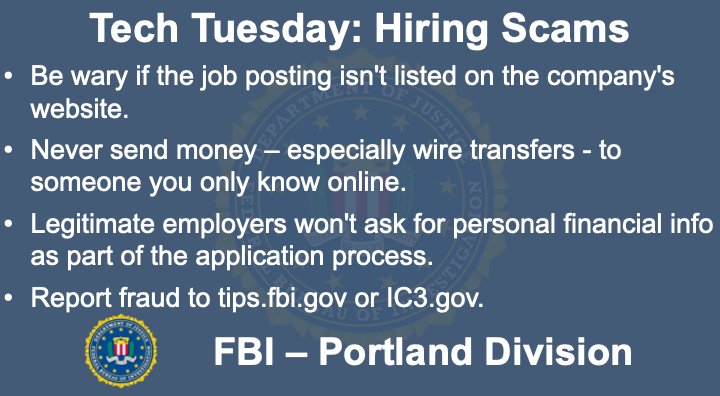Oregon FBI’s Tech Tuesday: Tips to avoid hiring scams, fraud

PORTLAND, Ore. (KTVZ) -- This week, the Oregon FBI’s Tech Tuesday feature focuses on building a digital defense against hiring scam frauds.
Millions of people have lost their jobs in the last few months – and if you aren’t one of them, you probably know someone who is. Whether you are just starting out or nearing retirement, the prospect of looking for a new job – maybe even in a new whole field – is daunting.
Unfortunately, there are plenty of scam artists out there ready to make what you already thought was a bad year worse. According to the FBI’s Internet Fraud Complaint Center (www.ic3.gov) the average victim loses about $3,000 in a hiring scam case, and that doesn’t even count the damage that their credit score will suffer.
Cyber-criminals are posing as legitimate employers by spoofing company websites and posting fake ads on popular online job boards. They conduct false interviews with unsuspecting applicants – often by video conference.
Once they offer the victim a job that doesn’t really exist, they follow up with employment contracts to sign and require copies of the victim’s driver’s license, Social Security card, and direct deposit information.
They may also ask for more bank account or credit card info, saying the victim will need to pay for an upfront background check, start-up equipment, or supplies.
In many cases, victims are told they will be reimbursed in their first paycheck… a paycheck that never shows up.
These cyber-criminals ask for the same information as legitimate employers, making it difficult to identify a hiring scam until it is too late. There are some indicators, though, to watch for, including:
- Interviews that are not conducted in-person or through a secure video call.
- Use of generic email accounts from a free provider – not one that goes back to the hiring company’s domain address.
- The requirement to purchase start-up equipment from the company.
- Requests by potential employers for your credit card information.
- Job postings that appear on job boards, but not on the company’s website.
Here are some ways to protect yourself as you start your job search:
- Research the hiring company. If you find multiple websites for the same company (abccompany.com and abccompanyllc.com), be wary. That may indicate fraudulent job listings.
- Legitimate companies will ask for personally identifiable information (PII) and bank account information for payroll purposes AFTER hiring employees. This information is safer to give in person. If in-person contact is not possible, a video call with the potential employer can confirm identity, especially if the company has a directory against which to compare employee photos.
- Never send money to someone you meet online, especially by wire transfer.
- Never provide credit card information to an employer.
- Never provide bank account information or your Social Security number to employers without verifying their identity.
If you feel as though you have come across a hiring scam in your job search, be sure to report it to the website on which the job posting was listed -- and to the company that the criminals were impersonating.
Also, if you believe you are the victim of an online scam, report it to FBI's Internet Crime Complaint Center at www.ic3.gov or call your local FBI office.